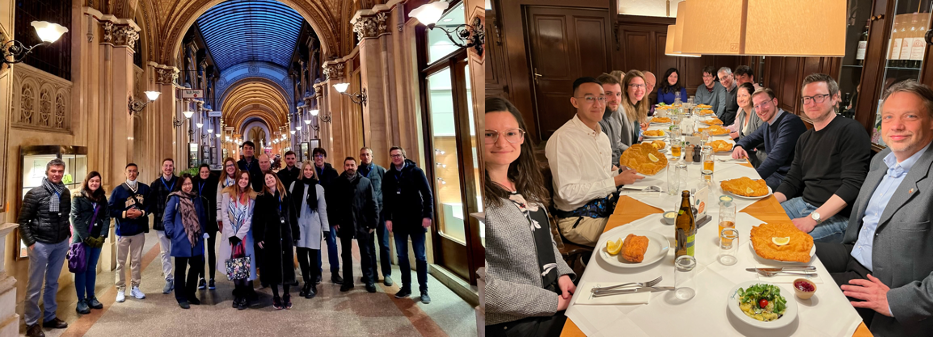|
Starting a PhD, most students are technically well-prepared for conducting research. Freshly graduated from Master programs, we are used to quickly grasp the theoretical backgrounds of different fields, translate them into experiments, and prepare fancy slides for presentation. Yet, what happens in-between, and after reading papers, pipetting colorless liquids, or writing code is not very well covered by lectures and practical courses. Despite early insight into academic and industrial working environments through internships and lab rotations, many potential pitfalls, and strategies to deal with them are only encountered, when already knee-deep into a situation that requires certain experience to handle. Needless to say, we as PhD students of the ALLODD ITN are in an especially challenging and equally exciting position, as we are not only facing a behemoth of scientific work but also have to adapt to different countries, cultures, and working environments, within a variety of events and secondments. On top of that, the ongoing COVID-19 pandemic took a toll on most parts of our social and academic life, which was often substituted by virtual solutions, leaving many of us isolated. Of course, the possibility of online participation simplified many aspects, as for example not having to travel and doing other things in parallel while listening to talks. However, meeting someone through a monitor after repeatedly asking for visual and auditory functionality often left a weird, unnatural feeling, making fruitful networking even harder. Many would also describe the months of virtual meetings as mentally exhausting – a feeling that has also been coined ‘Zoom fatigue’ (Yes, that is a real thing. You can read more about ‘Zoom fatigue’ here). In an attempt to escape the virtual void of Zoom and Microsoft Teams, almost all members of the ALLODD ITN gathered in person in Vienna for the first Workshop & PhD Induction Course. With its tight schedule of seminars spiked with coffee breaks, lunch, and dinner, the workshop left no space for ‘Zoom fatigue’. Apart from the networking and scientific exchange, the setting between original Viennese ‘Figlmüller Schnitzel’, a piece of breaded meat that is famous for being larger than the plate it is served on, and ‘Stiegl’ beer, allowed us to meet each other under natural, non-virtual circumstances. For me, this natural setting significantly simplified building connections; connections that most definitely facilitate collaboration and promote a comfortable working atmosphere, which in turn, is necessary when working together as closely as required within the ITN. Connecting and networking aside, the workshop also featured seminars that provided tools for communicating and personally dealing with conflict and failure, which, as noted in the beginning of this blog, are often not part of common university curricula. Yet, these tools can be considered pivotal strategies for being professionally and personally successful along the way and after our PhD studies. The keywords that were central in one of the seminars that I would like to highlight here, are work-life balance and resilience. The point that struck me most, mainly because I never thought about it this way, is that a healthy work-life balance and resilience are not only impaired by external stress factors such as harsh deadlines and scientific drawbacks but rather by our own reaction to those factors. These reactions are often characterized as perpetuum mobile-like loops that are built up by negative thoughts that lead to emotions and physical sensations that we cope with by quick fixes or so called ‘band aids’, whose negative consequences in turn lead to new negative emotions. The important point here is that realizing what the drivers of those loops are, enables us to break them or even rewire them to create positive loops. Learning this at the very beginning of our PhD studies that are paved with potential stress factors, is undoubtedly a valuable lesson that I can only recommend spending time on as early as possible.
As the pandemic seems to calm down, at least for now, I am certain that we are lucky to escape the tiredness of staring into our monitors displaying windows of our favorite video conferencing software again and, are able to meet in person for the next consortium event in Barcelona in June. Until then, I hope you enjoyed this blog post and the event in Vienna as much as I did!
0 Comments
Leave a Reply. |
- Home
- People
- Research
-
Training
-
Training Events
>
- 1st Workshop and PhD Induction Course
- 1st Training School & Networking Meeting
- Allostery in Drug Discovery Awareness Event and Symposium
- 2nd Training School & Networking Meeting
- IPR Training for Researchers & ESR Presentations on the Progress of their Research
- 3rd Training School & Networking Meeting
- European Conference in Allostery in Drug Discovery
- Secondments
- ALLODD Webinars
- Courses & Lectures
- Journal Club
-
Training Events
>
- Dissemination
- Events
- Newsroom
- Job Openings
- Blog
- Contact


 RSS Feed
RSS Feed
